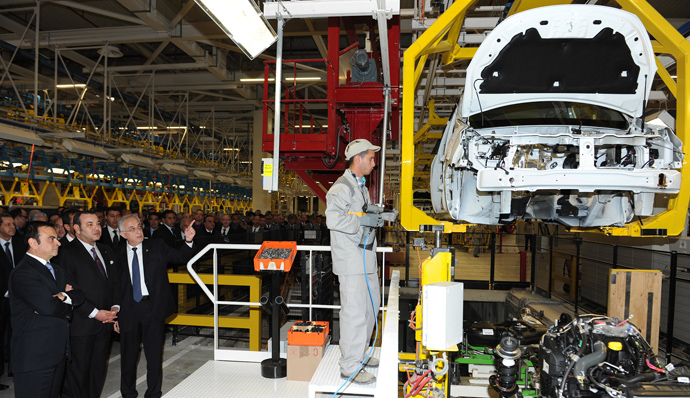Eng. Abdul Munim Al-Qady, Chairman of Division of Auto Feeding Industries & Intermediate Goods at the FEI’s Chamber of Engineering Industries, said “Despite the 20% increase in EGP USD exchange rate, the prices of fully imported auto spare parts rose by 30% while domestically manufactured spare parts have increased by 15% because due to there imported components”.
With regard to expansion in domestically assembled vehicles, Al-Qady noted, “Talking about domestically assembled vehicles means manufacturing at least 150 thousand vehicles a year with an increase up to one million vehicles within the next 5 years”.
Egypt has now about 18 automotive assembly plants, there production does not exceed 24 thousand vehicles of different car models a year. Some plants only produce 200 vehicles a month. Eng. Tariq Qabil, the Minister of Trade and Industry, said in previous statements that the Ministry of Trade and Industry has developed a 3-year action strategy and there is an urgent plan to register factories. He also pointed out that the industry has largely been ignored over the past years due to lack of access to gas, as well as, licensing and registration procedures problems. The Minister of Trade and Industry added that some laws, including Licensing Law, Food Safety Law and Importer Register Law, have been referred to the parliament.
It is to be noted that producing 1m cars means providing at least 6m jobs. Reaching more than half a million cars a year should turn Egypt from an importing country to an exporting country. This will positively affect the Egyptian economy, and will save the foreign currency used to import cars, components, and spare parts. Some Arab countries have a larger production volume, as French Renault established two factories in Morocco and another factory in Algeria. The annual production capacity of each factory is 400,000 cars. Morocco has recently produced one million vehicles a year”, while Saudi Arabia targets a production of 1 Million car by 2020.
For his part, Eng. Mohammad Al-Mohandes said, “The government plans to re-operate El Nasr Automotive Manufacturing Company yet there is no clear mechanism to implement this project on the ground so far. Egypt has a strong automotive infrastructure, while Africa & The Middle East are excellent export markets for accommodating an industry’s development with the current free Trade Agreements set with the Common Markets of Eastern and Southern Africa as well as the Middle East, prospects for Egypt’s automotive sector to export to the growing demands Africa and the Middle East are appealing. The effects in terms of economies of scale and foreign exchange earnings, could be just what is needed to revitalise the industry.
Eng. Tariq Qabil, pointed out that 95 % of the draft automotive industry strategy has been completed. In addition, he has discussed the law with the economic group and President Abdul Fattah El-Sisi and there is a strategy to increase manufacturing of local components by up to 60%.
As mentioned in a previous issue of Middle East Observer, June 2016, Tarek Kabil, Minister of Trade and Industry announced the desire of one of the leading French producer of cars to establish car assembly plant by a local component of large.
which is in line with the new strategy of the cars, which are based on the deepening of the industry by increasing the local component ratios and increase the added value and benefit from economies of scale in the axes under Egypt ‘s association with multiple markets allows access to 1.6 billion people.
The minister said, during a meeting with Vice company, said the company had expressed interest in contracting with Egyptian companies to manufacture cars necessary components to meet the needs of the company mother in France and its branches in various parts of the world, pointing out that he also discussed the industrial investment company possibilities in Egypt and take advantage of the industry base feeder for cars in the domestic market KIA Egypt will be the starting centre for the company’s products to the surrounding and particularly African markets.
He said the auto industry is one of the most important strategic industries that the government is seeking to develop them in order to attract many car companies worldwide to invest in Egypt, both in the automotive industry or its feeding industries, pointing out that Egypt has all what it takes to build this vital industry, especially in the light of experience accumulated over the past years by the presence of more than 15 global company that bring its cars in Egypt as well as the high quality of Egyptian products and automotive components which received the acceptance of the global automotive industry.
For his part, Vice President of the French company said that the company is ready to pump investments in Egypt based on incentives and benefits to be included in the new strategy for the development of the automotive industry.


